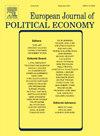商人候选人和他们的雇员:商人候选人如何利用他们的公司来当选?
IF 2.4
3区 经济学
Q2 ECONOMICS
引用次数: 0
摘要
商人政治家在世界各地的选举中表现出色。他们采用什么选举策略来赢得选票?这篇文章强调了私营部门的就业是分配政治中未被充分开发的资源。我认为商人政治家利用他们的公司动员员工作为竞选工作者,用工作来换取选举支持和服务。通过在泰国的列表实验,我发现了这种交换的证据:36.5%的雇员投票给他们的雇主,27.0%参加雇主的竞选集会,17.5%说服熟人支持他们的雇主,18.2%向选民分配短期利益,8.5%分配长期利益。我还提供证据表明,商人政治家利用私人雇佣来规避限制使用公共资源以获得选举利益的限制,通过显示在选举前两个月内雇用的雇员比在此期间以外雇用的雇员更有可能提供服务,这表明这些雇员是有意在选举期间支持竞选活动。本文章由计算机程序翻译,如有差异,请以英文原文为准。
Businessperson candidates and their employees: How do businessperson candidates use their firms to get elected?
Businessperson politicians perform well in elections worldwide. What electoral strategy do they employ to win votes? This article highlights private sector employment as an underexplored resource in distributive politics. I argue businessperson politicians leverage their firms to mobilize employees as campaign workers, exchanging jobs for electoral support and services. Using list experiments in Thailand, I find evidence of this exchange: 36.5 % of employees voted for their employer, 27.0 % attended employer's campaign rallies, 17.5 % persuaded acquaintances to support their employer, 18.2 % distributed short-term benefits to voters, and 8.5 % distributed long-term benefits. I also provide evidence that businessperson politicians use private employment to circumvent restrictions limiting use of public resources for electoral gains by showing employees hired within two months before election were more likely to provide services than those hired outside this period, suggesting these hires were intentionally brought to support campaign activities during election season.
求助全文
通过发布文献求助,成功后即可免费获取论文全文。
去求助
来源期刊

European Journal of Political Economy
Multiple-
CiteScore
3.40
自引率
10.00%
发文量
106
期刊介绍:
The aim of the European Journal of Political Economy is to disseminate original theoretical and empirical research on economic phenomena within a scope that encompasses collective decision making, political behavior, and the role of institutions. Contributions are invited from the international community of researchers. Manuscripts must be published in English. Starting 2008, the European Journal of Political Economy is indexed in the Social Sciences Citation Index published by Thomson Scientific (formerly ISI).
 求助内容:
求助内容: 应助结果提醒方式:
应助结果提醒方式:


